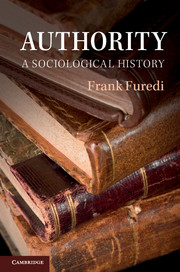Book contents
- Frontmatter
- Contents
- Preface
- Introduction: always in question
- 1 Thersites and the personification of anti-authority
- 2 Socrates and the quest for authority
- 3 Rome and the founding of authority
- 4 Augustus: a role model for authority through the ages
- 5 Medieval authority and the Investiture Contest
- 6 Medieval claim-making and the sociology of tradition
- 7 Reformation and the emergence of the problem of order
- 8 Hobbes and the problem of order
- 9 The rationalisation of authority
- 10 The limits of the authority of the rational
- 11 Taming public opinion and the quest for authority
- 12 Nineteenth-century authority on the defensive
- 13 Authority transformed into sociology's cause
- 14 The rise of negative theories of authority
- 15 By passing authority through the rationalisation of persuasion
- 16 In the shadow of authoritarianism
- Conclusion: final thoughts
- Bibliography
- Index
10 - The limits of the authority of the rational
Published online by Cambridge University Press: 05 June 2014
- Frontmatter
- Contents
- Preface
- Introduction: always in question
- 1 Thersites and the personification of anti-authority
- 2 Socrates and the quest for authority
- 3 Rome and the founding of authority
- 4 Augustus: a role model for authority through the ages
- 5 Medieval authority and the Investiture Contest
- 6 Medieval claim-making and the sociology of tradition
- 7 Reformation and the emergence of the problem of order
- 8 Hobbes and the problem of order
- 9 The rationalisation of authority
- 10 The limits of the authority of the rational
- 11 Taming public opinion and the quest for authority
- 12 Nineteenth-century authority on the defensive
- 13 Authority transformed into sociology's cause
- 14 The rise of negative theories of authority
- 15 By passing authority through the rationalisation of persuasion
- 16 In the shadow of authoritarianism
- Conclusion: final thoughts
- Bibliography
- Index
Summary
From the moment of its ‘discovery’, public opinion was portrayed as an all-powerful force that no ruler could ignore. In France, discussions surrounding the fate of the Old Regime adopted a tone of reverence towards public opinion; the lawyer and minister Chretien-Guillaume Malesherbes (1721–1799), in his maiden speech to the Académie Française in 1755, expressed the widely held sentiment that a ‘tribunal has arisen independent of powers and that all powers respect, that appreciates all talents, that pronounces on all people of merit’. This view that public opinion was the highest court in the life of the nation communicated the idea that henceforth only those who could represent or give voice to this new force could claim to possess real authority. Strictly speaking, the eighteenth-century idea that ‘opinion rules’ should be understood as the recognition of an important development, in which the validation of opinion becomes increasingly essential to the capacity to govern.
At first sight it is difficult to understand why public opinion was assigned such power by political thinkers. To be sure this era saw the expansion of the educated and professional classes, particularly in Western Europe, and the growth of printing and the press created a public that could develop its beliefs and ideas through accessing alternative sources of knowledge and information. However, despite its influence on intellectual and cultural life, public opinion was as much a construction of claim-makers as feature of material reality. The precondition for delineating opinion as an independent source of authority was the autonomisation of ideas and beliefs from established traditional sources. Belief could no longer be monopolised in circumstances where the contestation of knowledge had become the norm; and since opinion could not be taken for granted it had to be discovered, voiced and represented.
- Type
- Chapter
- Information
- AuthorityA Sociological History, pp. 229 - 246Publisher: Cambridge University PressPrint publication year: 2013



